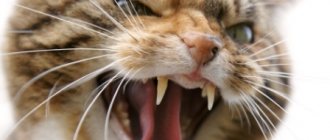Almost every person experiences a feeling of tenderness when looking at a little kitten. This mischievous, fluffy miracle gives a sea of positivity to all household members, especially children. But not every owner, when purchasing a kitten, wants it to continue its family line in the future. This is due to two main reasons: so as not to listen to constant heart-rending screams at night, and not to be in an eternal search for the source of the sharp unpleasant odor that cats emit during their “spring” periods.
Both reasons directly affect the comfort and peace of the entire family, so cat owners try to find ways to minimize interest in cats, often choosing surgical solutions to this problem.
General information
To understand why the castrato does not stop his love affairs, you need to imagine the meaning and essence of castration. Contrary to popular belief, it does not in all cases involve the physical removal of the testes (testicles).
The following types of castration exist:
- Surgical castration . The simplest, cheapest, and therefore the most common method. It involves surgical excision of the testes, i.e. complete removal of the gonads.
- Chemical sterilization . This method is not very popular in our country, but has a number of important advantages. In particular, these include the absence of the need for general anesthesia and the low traumatic nature of the operation. In fact, the whole procedure boils down to the introduction of sclerotizing agents into the thickness of the testes. These are substances due to which the testicle is completely replaced by connective tissue.
- Radiation castration . The name is scary, but there is no need to worry: the testes are irradiated with a directed beam of gamma radiation, after which their tissue completely dies. Fast, reliable, the likelihood of side effects is reduced to the minimum possible. No anesthesia is required, the cat only needs to be restrained. But the fixation must be reliable: if the radiation beam “processes” the insides of the cat, the consequences will be extremely sad. The method, however, cannot be considered cheap.
- Medical infertility . One of the most controversial methods. In this case, an implant is sewn under the animal’s skin, releasing medications (usually hormonal in origin) that suppress the pet’s libido. The testicles also remain intact. Moreover, after removal of the implant or due to the depletion of the supply of medications in it, after some time the cat’s sexual function is completely restored. The problem is that the constant effect of hormonal drugs on an animal’s body is extremely risky. Today, veterinarians believe that the risk of cancer and diseases of the endocrine glands increases significantly.
There is also a vasectomy . This procedure is a cross between full castration and medical infertility. The essence of the method is to ligate the vas deferens, as a result of which sperm is not released during ejaculation, but all other features of the cat’s sexual behavior remain. That is, the animal will run after cats, fight with its relatives, etc. Let us immediately note that in this case you should not be surprised by the characteristic “stomping”: in front of you is an absolutely “normal” cat, with fully preserved instincts and a set of sex hormones in the blood.
Pregnancy of a cat from a castrated cat
Regarding the question of whether a cat can become pregnant from a neutered male, we must take into account that the castration procedure itself is performed in two ways. The first involves cutting the scrotum and removing the testes, the second involves ligating or cutting the spermatic cords. With the first option, the cat’s sexual desire disappears, but with the second, it remains a full-fledged male.
Obviously, in the absence of semen production and its entry into the testicles, a cat cannot become pregnant from a castrated cat. But it should be remembered that it is the testicles that are removed, and not the pituitary gland, which is located in the brain and is responsible for reproductive function. If a cat has mated before surgery, the memory of this process remains in the brain. A cat can breed cats, but this will not produce offspring.
True, due to illiterate operation, a seed can still form. This happens when the spermatic cords are not completely clamped. As a rule, this seed is not viable, there is practically no chance of fertilization, but a negligible chance still exists.
As a rule, after surgery the animal needs to lie down and recover. However, it also happens that a cat mates with a cat immediately after castration. In this case, pregnancy is possible, although with a low probability. The new seed is no longer coming, but the old one still remains. The risk of fertilization remains for about a week after the procedure.
In cats, after sexual contact with a neutered person, a false pregnancy may develop. In this case, all external signs are present. This condition goes away on its own within 3-4 weeks, but sometimes lasts longer. It happens that even milk appears, and instead of kittens, the cat tries to care for toys. In such situations, it is worth consulting with a veterinarian; such conditions have an impact on the animal’s psyche.
Cat gets excited after surgical castration
Let's start with, perhaps, the most common de-depletion technique. Let's assume that the cat's testes have been completely removed, which automatically means that there are no sources of sex hormones in his body. So why does your pet continue to behave as if nothing unusual had happened to him, and why does he feel excited when he sees cats?
The answer may lie in the peculiarities of his physique. Sex hormones (and not only) perfectly accumulate (that is, accumulate) in subcutaneous fatty tissue and other fatty deposits. Accordingly, when lipids are metabolized, some of the hormones return to the general bloodstream. And contrary to the belief that neuters become immediately obese, in fact, in the first couple of weeks after surgery, your pet may well lose weight... as a result of which his body will receive a decent portion of sex hormones. If the animal’s diet after castration was better balanced and the cat gets into shape, gradually getting rid of fat accumulations, hormones will constantly enter its blood.
But there is another option... What if your pet initially did not look like a ball, and began to show signs of sexual arousal again, a considerable time after the operation? Here the problem may lie in the biochemical characteristics of a particular organism.
Why does a pet get excited in the first place? From the action of sex hormones, which should not be in the blood of a castrate... hypothetically. There are animals in which testosterone begins to be partially produced in the adrenal glands . Its quantity is small, but the hormonal background is such that it is enough for arousal.
So what to do in this case? If, apart from an interest in cats, there are no other problems, you can leave everything as it is. If in the spring the “inferior castrato” begins to annoy the owners with his screams and obscene pestering of their feet, you can use any medication intended for such purposes (“Sex Barrier”, “Cat Bayun”, etc.). The main thing is not to overdo it with them, since long-term use of such “sedatives” is fraught with the development of hormonal pathologies.
Recommendations for owners
If a cat asks for a cat after castration and continues to actively mark its territory, the owner should consult a veterinarian. Most likely, the doctor will recommend sedatives and possibly hormonal medications. This will help calm the pet and correct its behavior. You cannot select medications on your own.
You can try to distract a cat that is interested in the neighbor cats with a favorite treat, an interesting activity or a toy. A neutered cat who continues to trample cats should be given the opportunity to sharpen his claws. This is an important point that helps the animal mark its territory, maintain its high status and simply relieve stress.
In general, an undesirable style of behavior can manifest itself not only in setting on things, but sometimes on other cats. Animals often rub too hard against their owner’s hands or objects. It is better to stop such manifestations at the very beginning, but not by punishment, but by providing an alternative to get rid of accumulated energy. Interactive toys, such as a soft mouse or a ball, will help here.
When petting a cat, you should avoid overstimulating it. It is worth choosing those areas on the body that promote relaxation, stopping caresses when signs of arousal appear.
The cat gets excited after medical castration
In this case, everything is simpler, but also more complicated at the same time. What does it mean? The problem is that drug sterilization in 99% of cases does not completely suppress the production of sex hormones. And although the manufacturers of these drugs say one thing, practice shows something completely different: in most cases, “medical castrates” continue to show a certain interest in cats. It all depends on the characteristics of a particular organism and on the intensity of production of sex hormones.
The most correct solution to this problem is to change the drug used.
But! We would strongly advise against doing this yourself. Hormones are a very serious matter.
If you use them at random, nothing good will happen to your pet. It is better to consult an experienced veterinarian. Let the specialist select the optimal remedy, which at the same time will not threaten the cat’s health.
What problems does castration solve?
Let's look at the main reasons why owners decide to castrate a cat. Experienced animal lovers castrate their pets without any reason and before the onset of sexual heat. This method is the most reasonable because it allows you to avoid most behavioral problems and health difficulties for your pet. The optimal age for castration is considered to be the period from 7 to 9 months, when the cat’s body is physiologically formed.
When owners of one-year-old (and older) cats contact the clinic, there is always a reason, most often unpleasant and causing discomfort to both the owners and the pet. When entering sexual heat, the cat becomes more temperamental and even aggressive. The desire to find a partner for mating is accompanied by loud defiant screams and markings in the territory. As a rule, the owners are still willing to put up with the screams, but when the home is saturated with the persistent ammonia smell of urine, even the most patient people lose their nerve.
Owners of cats who roam freely on the street decide to resort to castration. Let's not lie, most owners do not care about the fate of kittens born from their pet. But when a pet returns from the street beaten, scratched and wounded, most owners admit the bitter truth.
For the right to mate with a female, cats fight fiercely, often to the point of serious injury and death. A neutered cat, accustomed to walking outside, will not lose its freedom-loving and hunting habits. However, owners note that pets stop leaving their own territory and are more concerned about protecting it.
Why does the animal become aroused after other types of castration?
So, why does your cat continue to “stomp” after other types of castration? Most likely, the factors are the same - either there are still sex hormones in his fatty tissue, or a small amount of testosterone is produced somewhere in your pet's body. Measures to eliminate this condition are the same as those we have already discussed above.
But! With chemical castration, other situations occur. If the sclerotizing drug was introduced and distributed unevenly within the tissues of the testis, part of the organ may remain in working condition. Simply put, the testicle (or both) will continue to secrete testosterone, as a result of which the cat will again begin to show interest in cats. Elimination of this cause is surgical castration.
What to consider
- A cat should be neutered before it has the opportunity to mate with a cat.
- You need to think carefully about whether such an operation is really necessary, whether there will be a desire to get offspring from a cat of one breed or another.
- If you decide to undergo castration, it is important to carefully choose a clinic and a doctor. The operation is not complicated and common, but it is still a surgical intervention on the body. It should not be done at home.
- After the procedure, you need to help the cat cope with the condition . You need to be near him as much as possible, if only to calm him down.
- The result of castration may not appear immediately; you need to wait several weeks, sometimes more. Hormonal levels will gradually decrease, and sexual arousal will occur less and less often.
In some cats, sex hormones, testosterone, can be produced in small quantities by the adrenal glands. The amount is really small, but it is enough to excite. What to do in this case.
If the cat does not bother you too much, you can endure some periods. When your pet screams loudly or constantly pesters you, you should give him one of the sedatives specially designed for animals. For example, “Cat Bayun”, known to many cat lovers.
How to behave when cats trample on the owner's body
Many do not understand how to behave if cats trample on a person with their paws, when they jump on us with a tender face, position themselves like a master and begin to trample, as if kneading dough. Moreover, cats can calmly release their claws at this time, but their reaction shows that these actions were not part of their plans.
Sometimes we have an ambiguous reaction to this, especially if sharp claws are pierced into a soft part of the body. There is no need to drive your pet away; you must remember that in this way he shows trust and love. If the cat is driven away at this time, it will suffer emotional stress and may even harbor a grudge.
When cats, trampling with their paws, put their claws into the owner's skin, then for safety reasons you can try to trim their nails. It is better to carry out this procedure by a specialist so as not to injure the animal. You can also use a special machine for this, which trims the claws a little, literally by 1-2 mm. It is better to carry out this procedure together so as not to injure the animal.
When the owner knows that his pet is prone to actions that cause him discomfort, then some tricks can be used to calm the animal's ardor. When a cat begins to trample the owner with its front paws, you need to hold them back a little and try to distract the pet with affection or a toy. Another maneuver during unwanted behavior is to gently pull the cat down. This way he will calm down and go to sleep. An option to distract from unwanted cat actions is to change the timbre of the voice; when the owner changes the intonation slightly, the pet becomes alert and changes its behavior.











